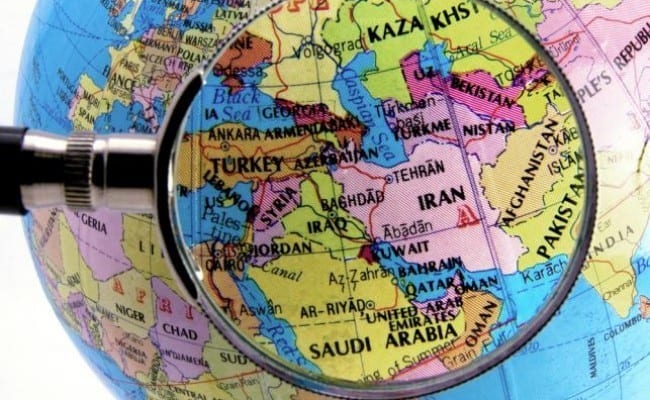Weekly Standard Editorial
In the months leading up to President Donald Trump’s May 8 decision to withdraw from the Iran nuclear deal, we’ve heard the same argument from the deal’s proponents: Iran is complying with the agreement. Why would we want to get rid of it? There is some truth to this, but it makes a glaring assumption: that the terms of the Iran deal were satisfactory in the first place.
Our chief complaint about the Joint Comprehensive Plan of Action, or JCPOA, was never that the Iranians would cheat. That much was expected and they have cheated—they’ve sought banned ballistic materials, for example, and exceeded the agreement’s limits on advanced centrifuges and heavy-water production. The confirmation last month of Tehran’s dishonest reporting about its nuclear program and intentions ahead of the signing of the 2015 deal made clear that the Iranians were never going to be serious partners, just as we and other opponents long warned.
The problem with the Iran deal was always the deal itself. The JCPOA allowed Iran to press ahead on developing delivery systems and scheduled an end to the embargo on importing conventional weapons and missiles. The agreement’s components on inspections of nuclear facilities were vague enough to allow the regime to hide certain facilities and to give inspectors the run-around. Even Barack Obama conceded, in a 2015 interview, that Iranian compliance with the deal would still allow them to “have advanced centrifuges that enrich uranium fairly rapidly” and that soon “the breakout times would have shrunk almost down to zero.”
President Trump was right to pull out of the deal, which was weak, and made with a regime that cannot be trusted to abide by the spirit of any agreement. The previous administration failed to grasp this easily perceptible truth because President Obama wanted an agreement that would revolutionize our Middle East policy and turn a powerful and longstanding foe into an ally. Tehran sensed Obama’s desperation—secretary of state John Kerry hardly bothered to conceal it—and skillfully extracted a deal that lifted sanctions, delivered a great deal of cash, and let them go on doing most of what they were doing already.
Which, of course, is why the regime now insists that it will continue complying with the terms of the deal. If the JCPOA were the tough deal its proponents sometimes claim it is, we should have expected Iran to exit as soon as it had a credible reason. Surely the Trump administration’s departure was that reason. And yet the mullahs say they’ll remain bound by the deal. Why? Because they’re happy to go on pretending they have no malign nuclear motives in hopes of keeping the other signatories—the United Kingdom, France, Russia, China, Germany, and the European Union—from re-imposing sanctions.
Former Obama officials and the transnational elite that created the deal don’t have much reason to complain, then. The JCPOA is still in effect, sans only one party. Presumably that is why so many of them are making peripheral complaints about Trump’s exit: that it will raise oil prices, that it will somehow monkey-wrench talks with North Korea, that it will kill contracts between Iran and American companies, and so on. These criticisms are beside the point. No one is claiming an exit from the deal would be cost-free.
Obama wanted to transform the Middle East by aligning America with Iran and ended up empowering and emboldening the region’s greatest sponsor of terrorism. The great irony is that Trump’s decision to pull out could—if handled judiciously—accomplish something of the transformation Obama sought but lacked the wisdom to achieve.
For decades, the two powers in the Middle East were Iran and Iraq. It was never a “balance of power” in the old sense; it didn’t generate peace, and the two warred brutally. Both detested America, though for a time in the 1980s the United States made a strategic alliance with Iraq against Iran. The Iraq War ended that heinous duality, but the mismanagement of its aftermath also created an opportunity for Iran to become a Middle Eastern hegemon—something it is feverishly trying to accomplish by funding Shia terrorist movements around the region and slowly arrogating weak governments in Beirut and elsewhere.
Now that Trump has finally rejected the Obama-era fantasy that we could entice Iran away from its theocratic delusions, a true balance of power could emerge. On one side, Iran and its proxies, sponsored by Russia. On the other, an Arab-Israeli-American coalition of openness and free markets.
The Israelis have long distrusted the regime in Tehran and they detested the nuclear deal. But so did the new and forward-thinking leader of Saudi Arabia, Mohammed bin Salman. So, for largely the same reasons, did the United Arab Emirates, Bahrain, and Kuwait. Governments in Cairo and Amman are not yet in a position to side openly with the United States or Israel, but they are deeply suspicious of Iranian expansionism and could be persuaded over time.
Media coverage of Trump’s decision, self-parodically one-sided, has focused on the disappointment of “America’s allies,” by which our colleagues at places like the New York Times and the New Yorker mean France, Great Britain, and Germany, whose interests in Iran are largely economic. But the Israelis, the Saudis, the Egyptians, and the Emiratis are our allies, too. And their interests are more fundamental: security, stability, even the right to exist.
These allies cautioned the United States against an agreement that would, by design, strengthen an American enemy and the region’s troublemaker. The Obama administration set those warnings aside in their obsessive pursuit of a foreign-policy achievement that Obama could claim as his legacy.
The shared opposition to the JCPOA among our disparate allies in the region has already contributed to unexepected advances in relations between the Israelis and the Saudis and the Emiratis. Could these unlikely temporary alliances lead to a broader realignment? Given the history of the region, the safe bet is the pessimistic one. But lost amidst the brow-furrowing and teeth-gnashing in Washington and New York is any acknowledgment of the opportunity.
In their anger and frustration, former officials and allies of the Obama administration have asked what the Trump administration plans to do now. Does it have a plan other than simply dismantling Obama’s legacy? This is a very fair question. Our advice: Think big.



















